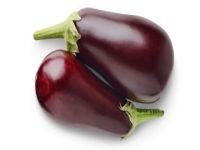Eggplant is food fiber
by Daniela Gonçalves

Common in vegetarian dishes, as a main ingredient in pies, lasagnas and salads, this fruit from India is rich in vitamins A, C, B1, B2 and B3, and beta-carotene, an antioxidant that converts into vitamin A in the body. It is widely consumed by having high nutritional value and only 20 calories per 100g.
For consistency similar to that of meat, it gives a feeling of satiety while it assists in weight loss and helps to control cholesterol due to low caloric content.
Prepared with cheese sauce to enhance its flavor, as is the case of mussacá (or mousaka), a typical Greek dish, it can be consumed in several ways. Stuffed, breaded, canned, it has a good amount of potassium, calcium, iron, copper and magnesium.
To avoid loss of all these nutrients, it is recommended that until the time of preparation that it be stored whole and unpeeled under refrigeration for a period no longer than four days. At room temperature, the durability is limited to 48 hours.
If stored for long periods or harvested early, it will look withered, wrinkled and soft and the flavor can be bitter and unpleasant. Bark of eggplant is also made into flour, with a large concentration of nutrients.
Widely used in diets, it also helps the proper functioning of the intestine.
Translated from the Portuguese version by:
Lisa Karpova
Pravda.Ru
Subscribe to Pravda.Ru Telegram channel, Facebook, RSS!


